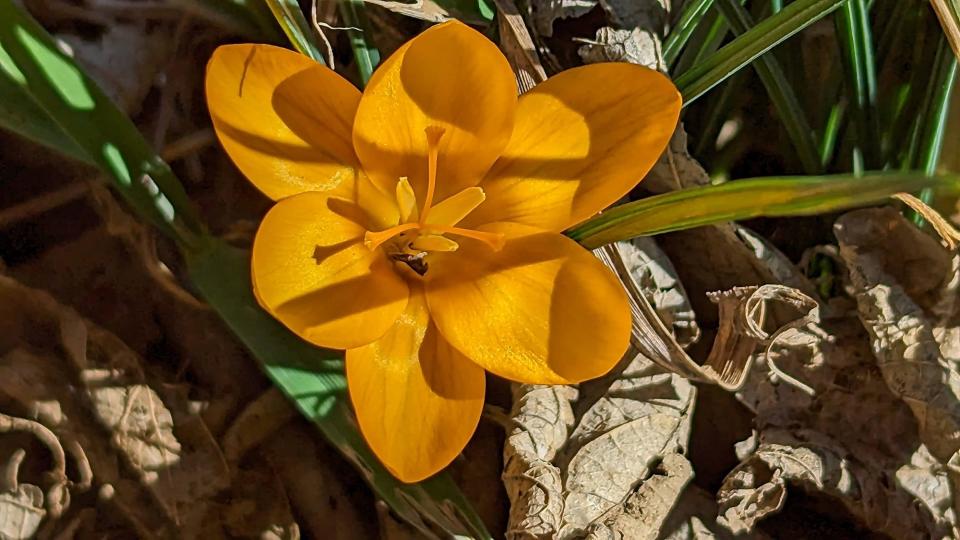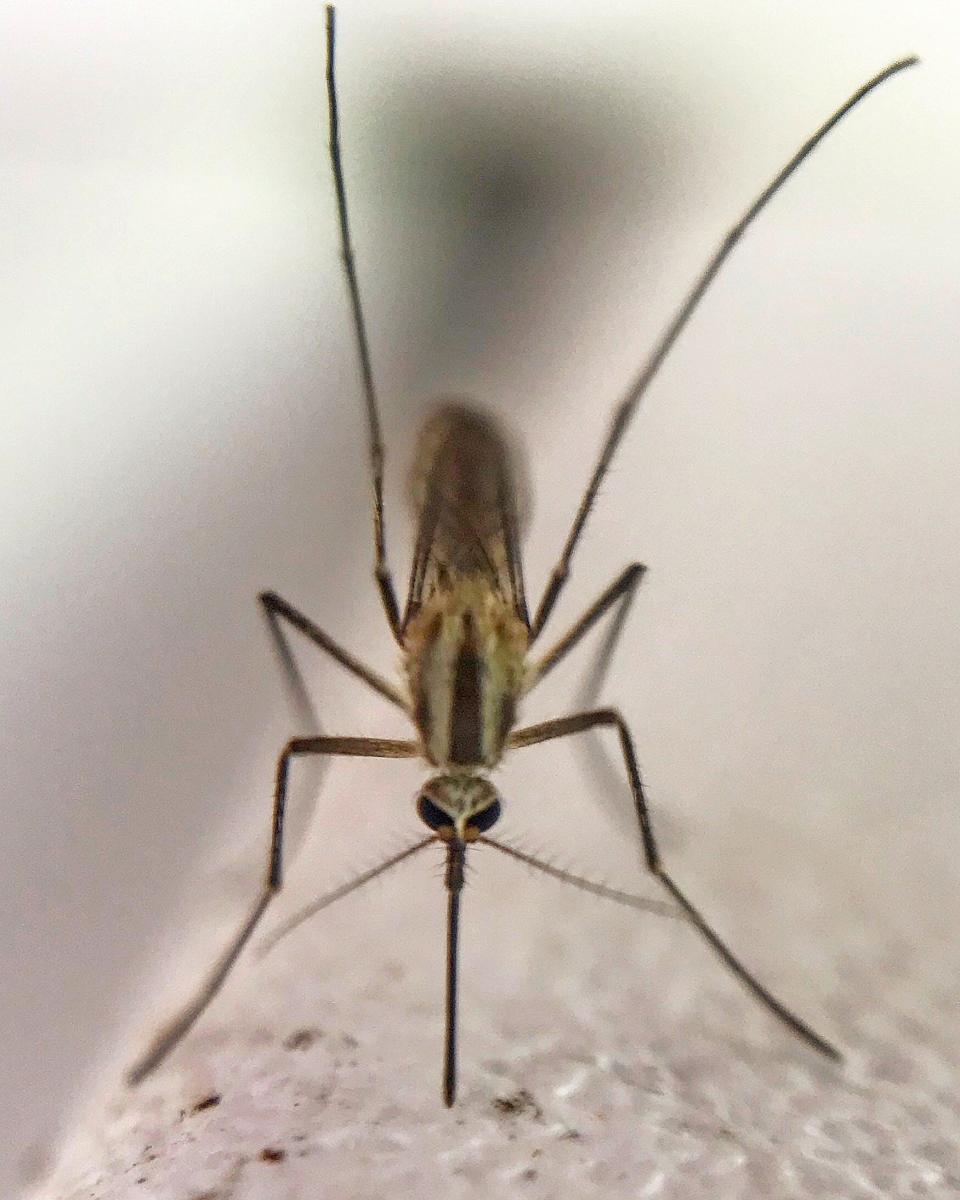Spring seems early this year. Here's what — and what not — to expect
March came in like a lamb. And it will probably go out like one.
Officially, spring began March 20. But for many of us, it felt like it started weeks earlier.
After a winter that was barely a winter, la primavera came knocking early — like that eager guest who arrives while we're still in the shower. Are we ready for spring? Are our allergies ready for spring? What does the season's early arrival mean for our gardens, the buds on our trees, the insects hatching in our ponds?
"Eight of New Jersey's 15 warmest springs have occurred since 2000," said Joel Flagler, a professor in the Agriculture and Natural Resources Department at Rutgers, and the university's agriculture extension agent for Bergen County.
Whether this will be one of them is too early to say — such things are measured after the fact. But it tracks with current trends. "We've all seen slowly rising temperatures," Flagler said.
Global warming is, of course, a central issue here. But its effects are more subtle than people sometimes think. Springs, generally, have been getting warmer, yes. But this particular spring is not so far outside the norm, Flagler said.
"There is a perception that because there was no snow, there was no winter," Flagler said. "That's not true. We had plenty of cold spells, and the ground froze up nice. The natural rhythms are not as disrupted as people might think."
Not to minimize the threat of climate change. But ever since the first equinox, people have worried that the seasons were going haywire. "The spring, the summer, The childing autumn, angry winter change Their wonted liveries," frets a character in Shakespeare's "A Midsummer Night's Dream." Supposedly, this referred to a real Elizabethan cold snap. Headline news in 1596.
Those who fear we must pay the piper for this unusually nice weather -— in the form of prematurely blooming plants and prematurely hatching insects — may be surprised. Mostly, things will be much as they are every spring, our experts predict. With some important caveats.
When will my plants bloom this spring? Will it be early?
Expect your flowers to bloom, and your trees to bud, more or less on schedule. Vegetable life, Flagler said, seems to be keeping to its accustomed program this year.

Why? Even if the temperature seems balmy to you, it doesn't mean your bulbs weren't shivering. Plants set their clocks not by air temperature, but by soil temperature. And it was definitely cold underground.
"It's the root zone that is taking note and monitoring," Flagler said. "If the ground is frozen, roots have no idea it's a warm day in January. It doesn't mean a whole lot to our plant life."
It's only when plants accumulate a certain consecutive number of growing degree days — air temperatures of 50 degrees or more, which gradually affect the soil — that they start to wake up. Different plants require different numbers of days. And in any case, this winter did not supply them. "A warm day in December, or a couple of warm days in January, doesn't mean a thing," Flagler said.
In his travels around North Jersey — monitoring conditions here is part of his job — he's seen no early forsythia or tulips. Just the usual daffodils and crocuses, and the early budding on the maples. (Tell us what you've seen, readers.)
Apple and peach growers, he said, shouldn't worry. And the rest of us don't need to alter our typical gardening plans. Just test your soil and read your almanac.
"The frost-free date is around Mother's Day, May 14," he said. "But pay attention to the weather report. Late frost can kill tender plants quickly."
When does allergy season start?
Ah, but if the plants are on their normal schedule, why am I already sneezing?

Allergist Catherine Monteleone says her patients are having symptoms earlier than usual. "This year, patients are complaining more than last year," she said. "Some patients are saying they needed to start their allergy medications earlier than normal."
Mold, she said, could be the culprit. "Particularly this year," said Monteleone, professor of medicine in the division of allergy, immunology, and infectious diseases at Rutgers Robert Wood Johnson Medical School.
"We had a warm winter and lot of moisture and not a lot of freezing," she said. "We have a lot of mold spores being shed."
What to do? If you're an allergy sufferer, you know the drill. "Air conditioning on, windows closed," Monteleone said. "It's important in the car, too. And if you have to start the medicines earlier, start them earlier."
When will mosquitoes come out?
Plants are in sync with the soil. But insects, like humans, go by air temperature.
Which means that mosquitoes — to name one fan favorite — could hatch early, after this mild winter. If it proves to be an exceptionally rainy spring, said George Hamilton, a specialist in pest management with the Rutgers Cooperative Extension. Skeeters need both: temperature and moisture.
"If we have a wet spring and there's enough water around, it's possible that some of the species might get active earlier than normal because of the mild winter," Hamilton said. "We saw some of that last spring."
Ants and termites could be more active, too, Flagler said. But the Godzilla of crawling pests — the King of Monsters — is the tick. As the winters get wimpier, they get stronger.

"We have seen a tremendous over-winter survival of ticks," Flagler said. "They don't die anymore. They've adapted to survive the winter. You can no longer say, 'It's winter, you don't have to worry.' If there's snow, they seem to be able to insulate themselves under the snow. If there's no snow, they live in piles of leaves."
Ticks (they're technically arachnids, not insects) don't just carry Lyme disease. They carry worse things. Powassan. Babesiosis. And the mild weather of the last four months has just made their job easier.
"On February 21, a month ago, I was bitten by an adult female deer tick," Flagler said. "The significance of this is that on February 21, you wouldn't expect ticks to live. But my dog walked through a pile of leaves and then sat on my lap. Right now, we should be way more focused on things like ticks than worried about our shrub coming into bloom early."
The good news from the insect kingdom? Bees. They may be the closest thing to a cheer-up story this spring.
Bees, as we know, have been having a rough time, with colony collapse disorder and other threats. But the mild weather seems to agree with them. "Bees are probably surviving better because of the warmer temperatures," Hamilton said.
Are birds migrating earlier?
So much for the bees. What about the birds? Any evidence of changes in bird habits, this mild spring, must be anecdotal.

"It's difficult to say for sure if it affected migration," said Don Torino, president of Bergen County Audubon Society. "We are seeing tree swallows that might be a week or two early. And that could put them in danger if it gets cold or they starve. Last year, we had three days of cold in May, and we lost many nestlings that needed insects."
Nature, he said, is interrelational. Everything depends on everything. That's why wonky weather is such a concern. In particular, sudden reversals of temperature. A cold snap, after many warm days, could be devastating.
"I think it really is the weather extremes that are the most dangerous," Torino said. "Nature has been perfectly timed with the plants, birds and insects. Weather changes can throw everything off. Right now our bald eagles in the state have chicks or are on eggs. They're doing good. But a cold freezing rain could kill the babies."
Are bears waking up earlier?
If there's one thing we know about bears, it's that they're grouchy when roused too soon (anyone with a husband, we're talking to you). This spring, there could be some bad-tempered bruins out there.

"Black bears can come out of their dens earlier during warmer temperatures," said Joseph B. Paulin, a conservation and wildlife management expert at Rutgers Cooperative Extension.
"If temperatures remain warm earlier in the year than usual, and natural foods are not yet available, bears may find their way into human-derived food sources, such as garbage that hasn't been properly stored, or backyard birdfeeders," he said.
The good news is that there are fewer bears than usual. "So far in 2023, we are likely seeing fewer reported sightings and complaints," Paulin said. About 80% fewer than last year at this time, in fact.
"That's because some bears were taken during the December hunt, to stabilize bear numbers and reduce unwanted human-bear interactions," he said.
When do the cherry trees blossom at Branch Brook Park?
To end on a happy note: The cherry blossoms that have appeared every spring since 1927 in Newark's Branch Brook Park — a place of pilgrimage for thousands each year — are right on schedule. This year, the peak bloom period for the 5,200 trees is expected to be April 1 to 5. "It's pretty much the same dates as we predicted for last year," said Jamie Wessel, a spokeswoman for the Essex County Parks Department.

"We kind of base it on when the peak bloom in Washington, D.C., is," Wessel said. "We're normally between 10 to 14 days after that."
This article originally appeared on NorthJersey.com: How will the mild winter affect you, and your garden?

